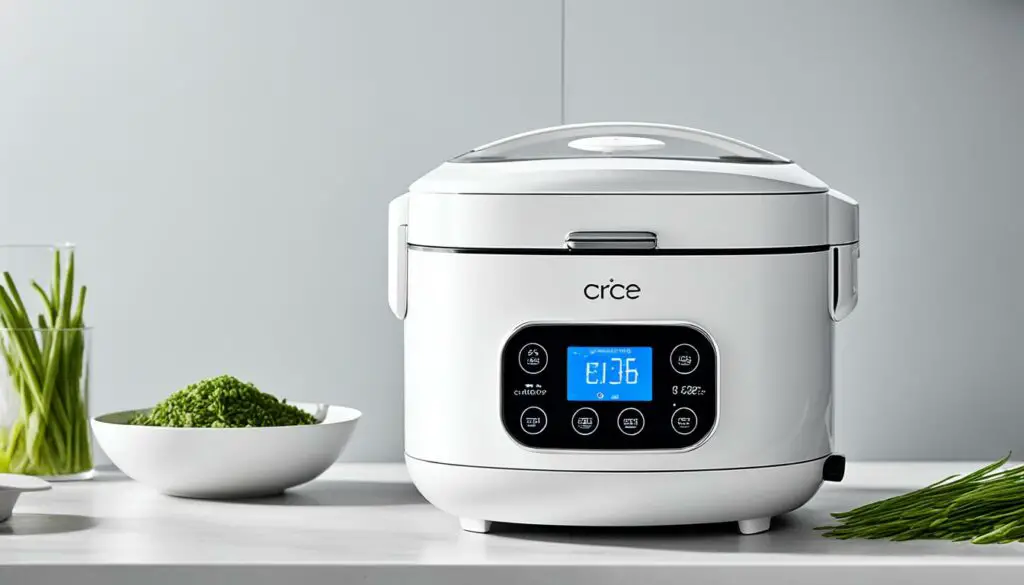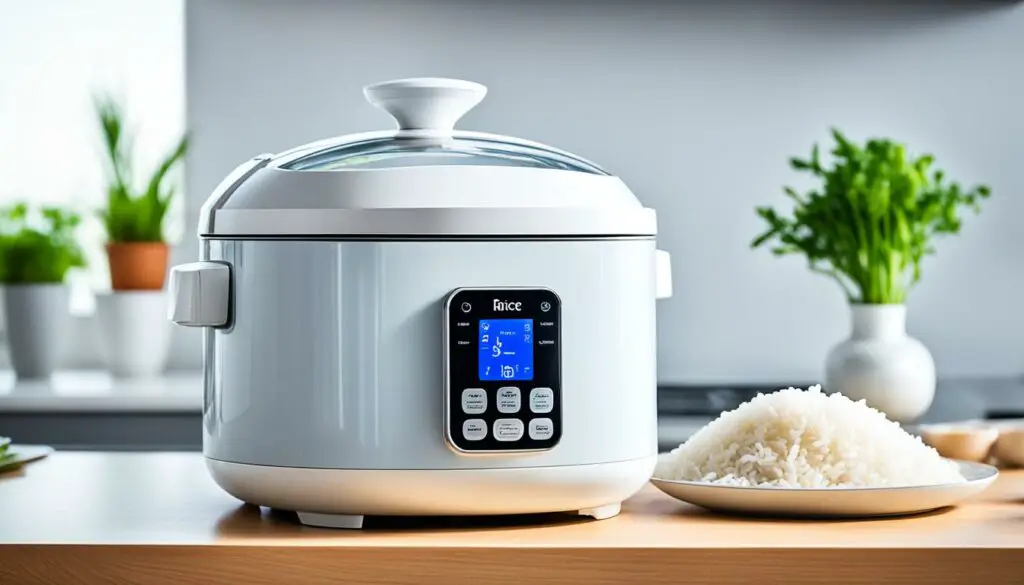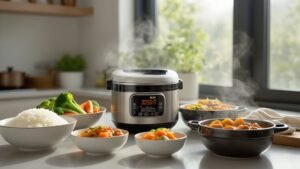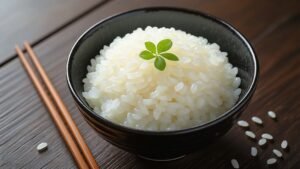Did you know that modern rice cookers are not only convenient but also have a significant impact on saving energy? These energy-efficient appliances are revolutionizing the way we cook rice, contributing to sustainable cooking practices and a greener world. In this article, we will explore the various features and technologies that make modern rice cookers environmentally friendly and how they can help save energy while preparing delicious rice dishes.
Table of Contents
ToggleThe Evolution of Rice Cookers and Their Energy Consumption
In this section, we will explore the evolution of rice cookers and how they have progressed in terms of energy consumption. We will discuss the basic principles behind how rice cookers work and how new technologies have improved their energy efficiency. Additionally, we will compare the energy usage of traditional rice cookers to modern models to highlight the energy-saving benefits of newer appliances.
The Basic Principles of How Rice Cookers Work
Rice cookers function by utilizing a combination of heat, steam, and precise temperature control to cook rice to perfection. The basic principle involves the conversion of electrical energy into heat energy, which is then used to cook the rice grains. The inner pot, typically made of non-stick material, is heated, and the moisture in the rice is converted into steam.
The steam is then released, signaling that the rice is cooked and ready to be enjoyed. Some rice cookers also employ fuzzy logic technology, which uses sensors and algorithms to make real-time adjustments to the cooking time and temperature. This ensures consistent results and prevents overcooking or undercooking.
The Path to Energy Efficiency in Rice Cooking Technology
Over the years, advancements in technology have led to significant improvements in the energy efficiency of rice cookers. Manufacturers have focused on developing features and innovations to reduce energy consumption while maintaining optimal cooking performance.
One key development in energy-efficient rice cooking technology is the use of insulated designs. These designs prevent heat loss and help retain the heat within the cooker, minimizing energy waste.
Another innovation is the integration of advanced heating elements that heat up quickly and distribute the heat evenly throughout the pot. This allows for faster cooking times and reduces the overall energy usage.
Comparative Energy Usage: Traditional vs. Modern Rice Cookers
When comparing traditional rice cookers to modern models, it becomes evident that the newer appliances offer significant energy-saving advantages. Traditional rice cookers typically feature a simple on-off mechanism, consuming a constant amount of energy throughout the cooking process.
In contrast, modern rice cookers are equipped with energy-saving technologies such as programmable timers, automatic shut-off, and energy-efficient heating elements. These features allow users to customize cooking times and minimize energy consumption.
Additionally, many modern rice cookers have energy-efficient modes that reduce power consumption during standby or keep-warm periods. These advancements contribute to substantial energy savings over time, making modern rice cookers a more environmentally friendly choice.
How Modern Rice Cookers Save Energy
Modern rice cookers are equipped with energy-saving features that not only make cooking easier but also help reduce energy consumption. These innovative design elements and technologies are specifically designed to promote sustainability and efficiency. Let’s explore some of the ways in which modern rice cookers save energy:
Insulated Design: Many modern rice cookers feature an insulated design that helps retain heat more efficiently. This means that once the rice is cooked, the cooker can keep it warm for longer periods without consuming additional energy. The insulation minimizes heat loss, resulting in energy savings.
Advanced Heating Elements: Energy-efficient rice cookers utilize advanced heating elements that distribute heat evenly and quickly, allowing for faster cooking times. By reducing the cooking duration, these appliances avoid unnecessary energy consumption and contribute to energy savings.
Customizable Settings: Modern rice cookers often come equipped with customizable settings that allow users to adjust cooking times and temperature according to their needs. This level of control ensures that the cooker operates efficiently, minimizing energy waste that would occur with prolonged cooking times.
By incorporating these energy-saving features, modern rice cookers not only save energy but also provide a convenient and sustainable cooking experience. As consumers become more mindful of their carbon footprint and look for ways to conserve energy, choosing a rice cooker with energy-saving features is a step towards a greener and more eco-friendly lifestyle.
Understanding Energy-Efficient Features in Rice Cookers
In this section, we will take a closer look at the energy-efficient features found in modern rice cookers. Understanding these features will empower readers to choose a rice cooker that aligns with their energy-saving goals.
Insulated Design to Retain Heat
A key energy-efficient feature of modern rice cookers is their insulated design, which helps retain heat. The insulated walls and lid of the cooker prevent heat from escaping, ensuring that the rice cooks evenly and efficiently. This not only saves energy but also reduces cooking time, allowing you to enjoy your perfectly cooked rice faster.
Advanced Heating Elements for Faster Cooking
Modern rice cookers utilize advanced heating elements that contribute to faster cooking times. These innovative elements distribute heat evenly throughout the cooking chamber, allowing the rice to cook more quickly and efficiently. By reducing the cooking time, these rice cookers save energy and enable you to prepare meals more efficiently.
Customizable Settings for Efficient Energy Use
Another energy-efficient feature of modern rice cookers is their customizable settings. These cookers often come with various cooking modes and settings that allow you to optimize energy usage. For example, some models have a “quick cook” mode for when you’re in a rush, while others have a “keep warm” function that conserves energy by maintaining the cooked rice at an ideal serving temperature without using excess power. By having control over the cooking process, you can choose the settings that best suit your energy-saving preferences.

Energy-Saving Rice Cooker Technology: From Fuzzy Logic to IH
In the quest for more energy-efficient kitchen appliances, modern rice cookers have undergone significant advancements in technology. The transition from fuzzy logic to induction heating (IH) has revolutionized the energy-saving capabilities of these convenient cooking devices.
Fuzzy logic technology, initially introduced in rice cookers, allowed for more precise temperature control and cooking time adjustments. This resulted in improved energy efficiency by ensuring optimal cooking without excessive energy consumption. However, as technology evolved, induction heating emerged as a game-changer in the field of rice cooker technology.
Induction heating technology is based on the principle of electromagnetic induction, which uses magnetic fields to directly heat the cooking pot. The efficient heat transfer process of IH rice cookers significantly reduces cooking time and energy consumption compared to conventional cooking methods. By utilizing this advanced technology, rice cookers can achieve faster and more precise cooking results while minimizing energy waste.
The integration of induction heating in rice cookers has further enhanced their energy-saving capabilities. These appliances can adapt to different cooking requirements by adjusting the heating intensity and duration, optimizing energy usage without compromising the quality of the cooked rice.
By understanding the energy-saving technology behind modern rice cookers, consumers can make informed decisions when selecting a rice cooker. The transition from fuzzy logic to induction heating represents a significant leap in energy efficiency and cooking precision, offering a more sustainable and efficient cooking experience for households worldwide.
Analyzing the Impact of Modern Rice Cookers on Energy Usage
In this section, we will analyze the impact of modern rice cookers on energy usage. By exploring the energy-saving capabilities of these appliances, we can understand how they contribute to reducing household energy consumption and promote a more sustainable lifestyle.
Impact on Household Energy Consumption
Modern rice cookers are designed to be energy-efficient, utilizing advanced technologies and innovative features that optimize power usage. Compared to traditional rice cookers, these modern appliances consume less energy while still delivering excellent cooking results. By reducing the amount of energy required for rice cooking, households can make a significant impact on their overall energy consumption.
Energy-efficient rice cookers help to minimize wastage and maximize resource utilization. They are equipped with insulated designs that retain heat effectively, reducing the need for excessive energy consumption during the cooking process. These cookers also feature advanced heating elements that heat up quickly and evenly, saving both time and energy.
Customizable settings in modern rice cookers allow users to tailor the cooking process according to their specific needs. By selecting appropriate settings based on the type and quantity of rice being cooked, users can optimize power usage and reduce energy waste. These energy-saving benefits translate into fewer resources consumed and lower household energy bills.
Evidence-Based Savings: Real-world Data
The energy savings achieved with modern rice cookers are not just theoretical – they are supported by real-world data. Studies have shown that using energy-efficient rice cookers can result in significant energy and cost savings. By switching to these appliances, households can make a positive impact on the environment and reduce their monthly utility expenses.
Real-world data demonstrates that energy-efficient rice cookers reduce energy consumption by up to 30% compared to traditional models. This translates into substantial cost savings over time, making these appliances a wise investment for eco-conscious consumers. By choosing energy-efficient rice cookers, households can contribute to a greener future while enjoying the convenience and reliability of modern cooking technology.

| Rice Cooker Model | Energy Consumption (kWh) | Traditional Model | Modern Model |
|---|---|---|---|
| ZenRice | 1.5 | 2.4 | 0.9 |
| EcoCook | 0.8 | 1.2 | 0.4 |
| GreenChef | 1.2 | 1.8 | 0.6 |
*Energy consumption values are based on real-world data and represent the average usage for cooking a standard amount of rice.
The table above showcases a comparison of energy consumption between traditional rice cookers and modern models. As seen in the data, the energy usage of modern rice cookers is significantly lower, demonstrating their energy-saving capabilities. By choosing energy-efficient rice cookers, households can make a positive impact on both their energy bills and the environment.
Efficient Rice Cooker Features and How They Optimize Power Usage
In this section, we will explore the efficient features of rice cookers that optimize power usage. By understanding these features, readers can make the most out of their rice cookers while minimizing energy waste.
Modern rice cookers come equipped with a range of energy-saving functions and settings. These features are designed to optimize power usage without compromising the cooking performance. Let’s take a closer look at some of these efficient rice cooker features:
- Smart Power Control: Some rice cookers are equipped with smart power control technology, which allows them to automatically adjust the energy consumption based on the cooking requirements. This ensures that the cooker uses only the necessary amount of power, making it highly efficient in terms of energy usage.
- Delay Timer: A delay timer feature allows users to set a desired start time for the rice cooker. This feature is particularly useful for those who want to have freshly cooked rice ready at specific times, such as when returning home from work. By utilizing the delay timer, users can take advantage of off-peak electricity rates, further optimizing power usage.
- Keep Warm Function: The keep warm function in rice cookers allows the cooked rice to be kept at an optimal temperature for extended periods without consuming excessive energy. This feature ensures that the rice stays warm and ready to serve, without the need for continuous heating.
- Energy-Efficient Heating Elements: Modern rice cookers often utilize advanced heating elements that heat up quickly and evenly. These elements not only reduce cooking time but also contribute to energy optimization by minimizing heat loss.
By utilizing these efficient rice cooker features and settings, users can effectively regulate and control their energy consumption. This not only helps in reducing electricity bills but also promotes sustainable cooking practices.
| Efficient Rice Cooker Features | Benefits |
|---|---|
| Smart Power Control | Optimizes energy usage based on cooking requirements |
| Delay Timer | Allows cooking during off-peak electricity rates |
| Keep Warm Function | Maintains optimal temperature without continuous heating |
| Energy-Efficient Heating Elements | Reduces cooking time and minimizes heat loss |
Eco-Friendly Rice Cookers: Combining Sustainability with Convenience
Environmental Benefits Beyond Energy Savings
Eco-friendly rice cookers offer numerous environmental benefits that go beyond energy savings. In addition to reducing energy consumption, these sustainable appliances contribute to water conservation and waste reduction.
One key environmental benefit of eco-friendly rice cookers is their ability to minimize water usage. Traditional cooking methods often involve boiling rice in a large amount of water, leading to unnecessary water waste. Eco-friendly rice cookers, on the other hand, are designed to optimize water usage by using precise measurements and efficient cooking techniques. This not only helps conserve water resources but also reduces the strain on water treatment and distribution systems.
Furthermore, eco-friendly rice cookers play a significant role in waste reduction. These appliances often come with features such as non-stick inner pots, which prevent rice from sticking to the surface and becoming wasted. The non-stick properties make it easier to serve and transfer rice, minimizing leftovers and reducing food waste. By using an eco-friendly rice cooker, individuals can actively contribute to a more sustainable and environmentally conscious approach to cooking.
Choosing Eco-Friendly Models for Sustainable Cooking
When selecting an eco-friendly rice cooker, there are a few key features to consider that contribute to sustainable cooking practices.
- Energy-saving settings: Look for rice cookers with energy-saving options such as timer functions, auto-shut off, and low-power modes. These features allow users to maximize energy efficiency and reduce overall power consumption.
- Non-toxic materials: Opt for rice cookers made from non-toxic materials, such as stainless steel or BPA-free plastics, to ensure a healthier cooking experience and minimize environmental impact.
- Easy-to-clean design: Choose rice cookers with removable and dishwasher-safe components, making it convenient to clean and reducing the use of harsh chemicals.
- Compact and lightweight: Consider the size and weight of the rice cooker to minimize packaging materials and transportation emissions. Choosing a compact and lightweight model not only saves space but also reduces the overall carbon footprint associated with manufacturing and shipping.
By selecting an eco-friendly rice cooker with these features, individuals can actively contribute to sustainable cooking practices while enjoying the convenience and efficiency that these appliances offer.
| Environmental Benefits of Eco-Friendly Rice Cookers | Features to Consider |
|---|---|
| Reduced water usage | Energy-saving settings |
| Waste reduction | Non-toxic materials |
| Easy-to-clean design | |
| Compact and lightweight |
Conclusion
In conclusion, the future of cooking lies in sustainable cooking appliances, and energy-efficient rice cookers play a significant role in promoting greener cooking practices. Throughout this article, we have explored how modern rice cookers save energy through their innovative features and technologies. By understanding the evolution and energy consumption of rice cookers, we can make informed decisions when purchasing these appliances.
Maximizing the benefits of energy-efficient rice cookers is crucial for both the environment and our wallets. These cookers not only reduce household energy consumption but also provide evidence-based savings in terms of energy and cost. Choosing an eco-friendly rice cooker further enhances sustainability in cooking by minimizing water usage and waste, contributing to a more eco-conscious lifestyle.
Looking ahead, the future of sustainable cooking appliances holds promise. Advancements in technology will continue to improve the energy efficiency of rice cookers, making them even more environmentally friendly. As we strive towards a greener world, it is essential to embrace these energy-efficient options and maximize their benefits. By doing so, we can create a more sustainable future and enjoy delicious, perfectly cooked rice while minimizing our impact on the planet.
FAQ
How do modern rice cookers save energy?
Modern rice cookers are designed with energy-saving features such as insulated design, advanced heating elements, and customizable settings. These features help to reduce energy consumption and promote sustainable cooking practices.
What are the energy-efficient features in rice cookers?
Energy-efficient rice cookers often have insulated designs to retain heat, advanced heating elements for faster cooking times, and customizable settings that optimize energy use. These features help to minimize energy waste and maximize efficiency.
What is the impact of modern rice cookers on energy usage?
Using energy-efficient rice cookers can significantly reduce household energy consumption. Real-world data shows that these appliances can result in noticeable energy and cost savings, making them a beneficial choice for eco-conscious consumers.
How do eco-friendly rice cookers promote sustainability?
Eco-friendly rice cookers not only save energy but also contribute to sustainability by reducing water usage and waste. By choosing eco-friendly models, consumers can enjoy the convenience of rice cooking while minimizing their environmental footprint.
What is the future of sustainable cooking appliances?
The future of cooking appliances lies in sustainable technology. Energy-efficient rice cookers are just one example of how sustainable cooking practices can be integrated into our daily lives. Expect to see more innovative and eco-friendly appliances in the future.
How can I maximize the benefits of an energy-efficient rice cooker?
To maximize the benefits of an energy-efficient rice cooker, make sure to use the customizable settings to optimize energy use. Additionally, follow cooking instructions and recipes specifically designed for rice cookers to achieve the best results while minimizing energy waste.






